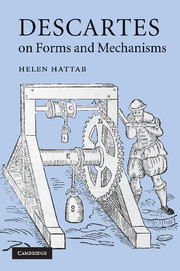Book contents
- Frontmatter
- Contents
- Acknowledgments
- List of abbreviations
- Introduction
- PART I RESURRECTING THE SUBSTANTIAL FORM
- 1 Descartes' arguments against the substantial form
- 2 Aquinas' introduction of the substantial form
- 3 Suarez's defense of the substantial form
- PART II CHALLENGING THE SUBSTANTIAL FORM
- PART III ELIMINATING SUBSTANTIAL FORMS
- Works cited
- Index
1 - Descartes' arguments against the substantial form
Published online by Cambridge University Press: 15 September 2009
- Frontmatter
- Contents
- Acknowledgments
- List of abbreviations
- Introduction
- PART I RESURRECTING THE SUBSTANTIAL FORM
- 1 Descartes' arguments against the substantial form
- 2 Aquinas' introduction of the substantial form
- 3 Suarez's defense of the substantial form
- PART II CHALLENGING THE SUBSTANTIAL FORM
- PART III ELIMINATING SUBSTANTIAL FORMS
- Works cited
- Index
Summary
Descartes' most sustained arguments against substantial forms occur in the correspondence of January 1642 with Henricus Regius, where Descartes instructs his Dutch disciple how to defend himself against Voetius' attacks on the Cartesian natural philosophy Regius taught at the University of Utrecht. For Regius' benefit, Descartes collects several objections against substantial forms one finds throughout his writings and adds a few more. He organizes his discussion around seven theses, following the structure and order of Voetius' objections, and urges Regius to employ and elaborate on his suggested replies in answering Voetius. In the course of countering some of Voetius' specific points, Descartes offers several arguments to defend the superiority of Cartesian principles over the Scholastic notions of substantial forms and real qualities. These can be divided into two broad classes: scientific arguments and metaphysical arguments. The scientific arguments can be further subdivided into three distinct ones. (1) In the first and fourth theses, Descartes argues from the use of substantial forms in physics, claiming they are unnecessary and pointing to the explanatory success of his scientific principles. (2) In the second and third theses he employs an analogy between natural objects and machines to show that substantial forms are no more necessary to explain the actions of the former than the latter. (3) In the fifth thesis he charges that scientific explanations in terms of substantial forms explain the obscure by the more obscure.
Descartes likewise offers three distinct metaphysical arguments.
- Type
- Chapter
- Information
- Descartes on Forms and Mechanisms , pp. 16 - 30Publisher: Cambridge University PressPrint publication year: 2009



